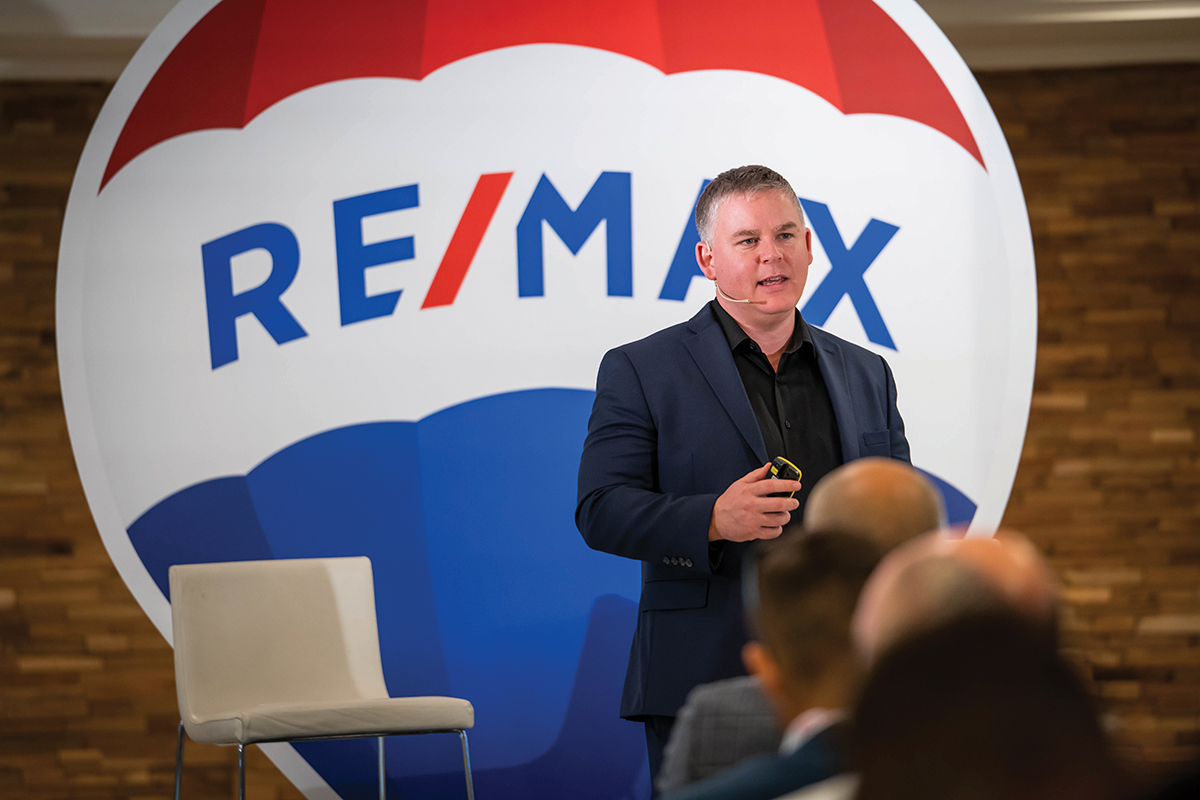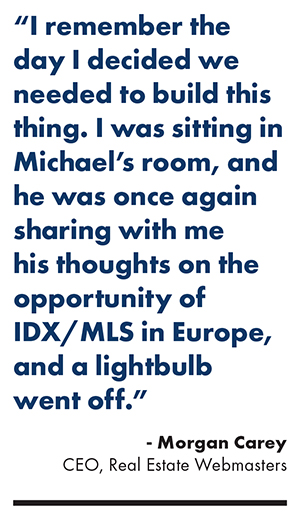Real Estate Webmasters (REW) is taking on a huge challenge. The worldwide leader in real estate websites, lead generation and CRM is building a global MLS and leveraging new artificial intelligence technologies via OpenAI/ChatGPT. With the help of its new AI Robot, REWPert, the company’s goal is to solve the global problem of consumer access and transparency in real estate.
“It’s 2023. Consumers want access to all listings and full transparency. What we’ve learned in North America is that not only does shared information make the consumer happy…it generates more leads for real estate brokerages, and helps homes sell faster for a higher price,” says Morgan Carey, CEO of Real Estate Webmasters.
“We want to help educate the global brokerage market on these concepts and bring these benefits to their companies. In the process, we see a multi-billion-dollar opportunity for tech companies such as ourselves to provide implementation services, consulting, marketing and SAAS platforms to help forward-thinking brokers and agents capitalize on a new paradigm,” adds Carey.
Why do we need a global MLS?
As an international buyer trying to purchase a property abroad, the home-search process is often less than ideal.
According to Carey, most brokers in other countries are stuck in the dark ages of thinking that withholding information about properties and forcing buyers to come to them is the best way to ensure they capture a transaction. “They do not cooperate. They do not share. It’s a draconian process that frustrates searchers to no end and harms sellers by denying their property full access to the free market,” he says.
The internet has changed everything. “We live in a world where consumers expect full and unfettered access to information so that they can do their own research, read reviews and empower themselves with data,” he adds.
In North America, real estate has evolved
Buyers have full access to all home listings via the MLS and brokers participate in reciprocity so that no matter who is representing a buyer, that buyer can make an informed decision.
Through reciprocity, sellers benefit as well. By sharing listings with each other, those listings get significantly more visibility—and thus, selling agents are able to create more demand for the properties. The net result is increased competition in offers and, ultimately, homes that sell faster and for higher prices.
“It’s a win/win for both the buying and selling agent. And a win/win for the buyer and the seller,” says Carey.
Reciprocity means more leads for brokers
Another well-known benefit of the North American model of IDX/MLS reciprocity is that by sharing listings, brokers are able to generate more leads for their agents, explains Carey.
“The average listing can generate 10 – 20 inquiries or more. If you have one or two listings, that means you will receive 10 – 40 leads. Logic dictates that only one of those leads can buy any one of those listings, and so, every other inquiry is a potential source of business if you have access to listings to sell them,” he explains.
According to Carey, if you don’t have access to other listings, there is no motivation for you to try to help with those other inquiries once your listing is sold. This is why broker reciprocity makes so much sense.

Real Estate Webmasters did not come to this conclusion on its own
The idea for a global MLS actually started with Michael Polzler, CEO of RE/MAX Europe, who has been advocating for reciprocity for years to his 30,000-plus agents and brokers in 40 countries, says Carey. Polzler got his start in the North American real estate market through the family-owned RE/MAX Integra, founded by his father Frank Polzler and Frank’s business partner Walter Schneider.
Prior to COVID, Polzler invited Carey to be a speaker at his ownership group meetings to help further educate his master franchise owners on the benefits of MLS technology, websites, lead generation and cooperation. From those meetings, RE/MAX Europe became a client of Real Estate Webmasters, and they continued to discuss the potential of a global MLS.
“I remember the day I decided we needed to build this thing,” says Carey. “I was sitting in Michael’s room, and he was once again sharing with me his thoughts on the opportunity of IDX/MLS in Europe, and a lightbulb went off. We need to do this! I was super excited. So excited in fact that I posted a picture with the caption ‘Not quite ready to talk about it yet (but I will soon, I promise), but this 5 a.m. meeting might just go down as one of the most important business meetings of my life.’”

According to Carey, several use cases exist for a global MLS:
Reciprocity. The most obvious use case has already been discussed, and that is reciprocity. Through sharing of listings, brokers and agents now have access to inventory previously unavailable to them, which will help them find a property for their buyers sooner. For sellers, this means more exposure, which leads to a faster sale at a higher price.
IDX websites. One of the most powerful ways the North American market leverages MLS is through what is referred to as IDX (Internet Data Exchange). “By having a shared data feed, brokerages are able to have websites built that combine amazing SEO with listings to capture hundreds or even thousands of monthly leads,” says Carey.
“An additional benefit of IDX feeds is that you can build custom applications to suit use cases such as CMA tools, reporting, competitive research and recruiting insights,” he says.
Data distribution. In much of the world, portals have a very strong online presence. In the current model, each brokerage must maintain its own data feeds and manage relationships with five, sometimes 10 portals, which takes both time and cost.
By having a centralized MLS, explains Carey, brokers have only one relationship to manage (the global MLS), and through economies of scale, integrations with portals and other distribution partners take far less time and are far more cost-effective. Another benefit of this scale is that the global MLS can invest more heavily in deeper, more robust integrations, which bring more value to the integration and, ultimately, to the broker.
Building a global portal. The final use case is building a single, global portal.

“It stands to reason that if international buyers who had not decided where they wanted to purchase yet had one single place to search properties that had all global listings, an extremely friendly and consistent user interface, and more listing data than any other portal, it would be a worldwide hit and be able to rank very highly in search engines,” says Carey.
Real Estate Webmasters plans on building such a portal as a value-add to its listing partners. Through the portal itself, subscribing members will be given access to organic leads at no cost to them, thus enabling even greater ROI from participation in the MLS.
“That’s the value exchange. Brokers by themselves can’t do much with a few listings, but those listings in aggregate and at scale are massively valuable. There is no MLS without listings, so we provide a copy of all the organic leads back to participating brokers in exchange for their listings. They get portal-quality leads at no cost to them, and we get the listings we need in order to build this global powerhouse,” says Carey.
Translations: A challenge no longer
It was long thought that the biggest challenge in launching a global MLS was language translation. Imagine writing thousands of pages of amazing content and publishing millions of MLS listings, then having to provide properly translated versions of each in every language.
The idea is so daunting that it seems impossible. However, modern browsers have solved this problem.
According to Statista, the top four browsers in Europe are Chrome (58.5%), Safari (21.5%), Firefox (5.5%) and Microsoft Edge (6%), covering 91.5% of all web traffic. All four browsers have the option of automatic language translation. Over 500 million people use Google Translate daily, confirming the adoption of this technology.
Because users now leverage their browsers to translate content for them, it makes the challenge much easier. Now, the only challenge is ensuring that web applications are built in a “translation-friendly” way, says Carey, leveraging web development best practices. Real Estate Webmasters’ Renaissance framework is built in such a way, ensuring that all critical content on its websites is easily readable and translatable by browsers.
In addition to browser support, Real Estate Webmasters will also be leveraging the powerful Google Translations API for on-the-fly translations for customer websites/portals.

Leveraging REW’s new AI Robot, REWPert
To enable this global MLS and provide a unique, high-value application to consumers and brokers, Real Estate Webmasters is leveraging the power of AI (artificial intelligence).
Built on the openAI, ChatGPT frameworks, REW’s new AI robot, aptly named REWPert, is being used to add rocket fuel to this project.
REW plans on utilizing REWpert for the following tasks, to name just a few:
Content creation: Google has released new guidelines for content creation using AI, stating that content must be truly useful for readers (and not just for search engine rankings), regardless of the method.
By leveraging AI to build out page frameworks and research areas, assist with spelling, grammar and presentation, Real Estate Webmasters believes it is able to create far more truly useful content faster.
“It’s a concept called ‘human-assisted AI,’ where we leverage the amazing toolkits available to us, but then we apply our 20-plus years of experience in copywriting, editing, research and implementation to ensure the highest quality user experience and most accurate data,” says Carey.

SEO (search engine optimization): Getting real estate content to rank highly in search engines has been a staple of Real Estate Webmasters’ offerings since its inception. With AI, the company is able to scale its SEO efforts, rank pages in multiple languages and discover new keyword opportunities faster and with greater effectiveness.
Schema markup: One of the most underrated features in web development for search engines as well as users is the implementation of Schema markup, says Carey. “REWPert AI has been trained to implement Schema markup for all sorts of use cases, from providing regional FAQs in JSON format to offering microdata on open houses. Google loves schema and often gives it preferential treatment in search engines,” he says.

Translation: Content translation is one of AI’s superpowers. Although modern browsers can easily translate content for visitors in any language, thus removing the blocker of needing to translate “all content,” there are still cases such as wanting to rank for SEO or needing to send listing data to an alternate language portal where being able to translate on-page content is highly valuable.
AI is extremely good at content translation, and Real Estate Webmasters plans on leveraging this to translate its most critical, high-value content into the most search languages in order to assist with traffic generation as well as provide a value-add for consumers, explains Carey.
“Things like blog articles, listing data, area information and reports can all be translated into any language using REWPert,” he says.
Next steps for Real Estate Webmasters and its Global MLS
Real Estate Webmasters is already working with some significant partners like LuxuryRealEstate.com and RISMedia, which are leveraging REW’s MLS technologies to feed listing data from shared clients to various online tools and portals.
“For decades, real estate professionals worldwide have been discussing the need for better data-sharing innovation. We’re excited to see Real Estate Webmasters take their expertise in MLS technology to a global level. A Global MLS will be revolutionary for the industry,” says Meghan Barry, president of Who’s Who in Luxury Real Estate.
“Our next goal is to sign on the major franchises like Anywhere, eXp Realty and RE/MAX to start having their listings flow into the global MLS and subsequently be able to offer IDX-enabled websites, marketing and CRM services to their global members. With RE/MAX, for instance, we already have all of Ireland, England and Wales signed up,” says Carey.

“There is definitely a buzz, but it will be slow going if we have to sign up every single country, regional owner by regional owner. I’m confident that several of the top brands will recognize the value of this transformative project for their members and start feeding us listings at the franchise level,” he adds.
“Consumers are becoming extremely sophisticated, and meeting their needs in the future demands that real estate professionals are equipped with the best data-sharing systems and tools available. Globally, markets have lagged behind in the race to deliver a system that adequately meets the challenges that our industry is facing in this regard. Morgan Carey is one of the most progressive, innovative global real estate leaders in our industry. With leaders like Morgan and others joining the quest, perhaps the elusive—and yes, revolutionary global IDX/MLS, will finally become a reality,” adds John Featherston, founder, president and CEO of RISMedia.
An AI/ChatGPT-powered approach
On the platform side, the real estate AI robot REWPert is accelerating at a rapid pace. It now supports chat GPT4 as well as several highly advanced OpenAI-powered modules.
“The most exciting feature currently being developed is the ability to have REWpert engage directly with the REW CRM to assist agents in following up with their prospects more professionally,” says Carey, “and in any language.”
For more information, visit https://www.realestatewebmasters.com.












